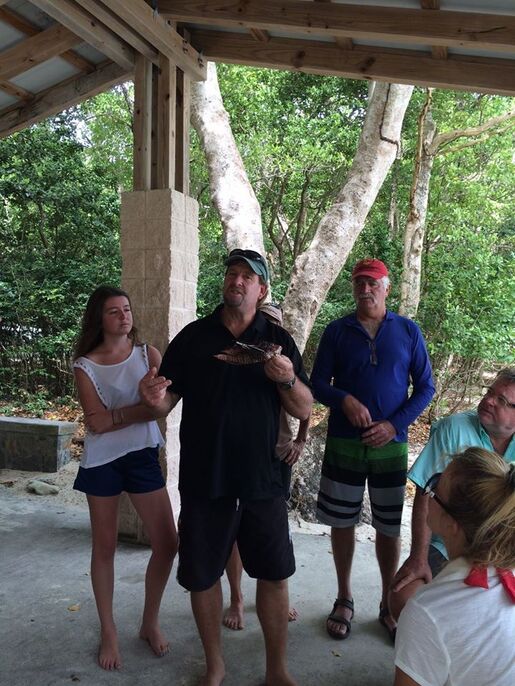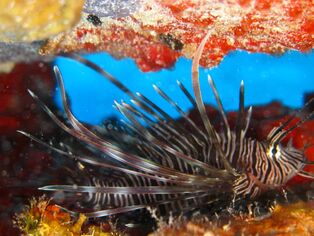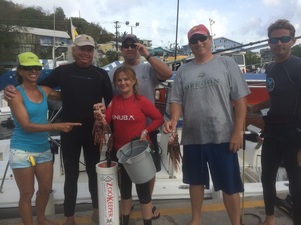attend a Community Lionfish Response Program (CLRP) training course

In 2010, the Caribbean Lionfish Response Program, developed and implemented structured training to increase the positive effects of an invasive species management plan. Training individuals to properly search for and extract lionfish while preserving the integrity of the environment is essential for all marine areas as well as Marine Protected Areas. With the decline of reef systems and fish populations in the last century, it is crucial to avoid negative impact while searching for and extracting invasive lionfish.
C.O.R.E. Dive Directors provide training courses throughout the USVI. The Invasive Lionfish Systematic Search and Caribbean Lionfish Response Collection and Extraction training courses are taught to scuba divers as well as freedivers. Powerpoint academic sessions are conducted prior to in-water training. In-water training assesses buoyancy control, proper equipment handling, target practice and proper target assessment. These courses instruct divers how to correctly participate in organized lionfish management dives as well as conduct safe, eco-friendly extractions on their own.
C.O.R.E. Dive Directors provide training courses throughout the USVI. The Invasive Lionfish Systematic Search and Caribbean Lionfish Response Collection and Extraction training courses are taught to scuba divers as well as freedivers. Powerpoint academic sessions are conducted prior to in-water training. In-water training assesses buoyancy control, proper equipment handling, target practice and proper target assessment. These courses instruct divers how to correctly participate in organized lionfish management dives as well as conduct safe, eco-friendly extractions on their own.
Invasive Lionfish Systematic Search Training &
Freediving and scuba courses

C.O.R.E.'s Invasive Lionfish Systematic Search training course trains divers how to participate in group led systematic lionfish search dives. Systematic Search dives are important when looking for lionfish in a variety of underwater environments. A structured, systematic search will provide quality searches rather than quantity of area covered.
Invasive lionfish have a natural ability to blend in well with their environment as well as the ability to hide upside-down under coral heads.
Therefore, it is very important to do a thorough search of every sponge, coral head, overhang and recess. Mastery of neutral buoyancy is imperative in conducting a quality search while avoiding any contact with the sponge, hard and soft corals.
Invasive lionfish have a natural ability to blend in well with their environment as well as the ability to hide upside-down under coral heads.
Therefore, it is very important to do a thorough search of every sponge, coral head, overhang and recess. Mastery of neutral buoyancy is imperative in conducting a quality search while avoiding any contact with the sponge, hard and soft corals.
Caribbean Lionfish Response Training

Caribbean Lionfish Response Training is for advanced freedivers and scuba divers to extract or collect lionfish. C.O.R.E. trains different techniques to safely collect or dispatch both juvenile and adult lionfish. All training stresses safe, eco-friendly procedures. It is important to always practice eco-friendly extractions to properly preserve the environment. Therefore, buoyancy as well as safe, eco-friendly extractions are essential aspects of training.
Training was written and developed by C.O.R.E. PADI Instructors. C.O.R.E.'s structured training is conducted by PADI Instructors and Divemasters. C.O.R.E. training is accepted by several Marine Protected Areas. C.O.R.E. submitted safe, eco-friendly training to U.S. Virgin Islands Department of Parks and Natural Resources, USNP St. John and NOAA to be conducted in the USVI. C.O.R.E.'s training is listed in several territorial lionfish management plans.
Training was written and developed by C.O.R.E. PADI Instructors. C.O.R.E.'s structured training is conducted by PADI Instructors and Divemasters. C.O.R.E. training is accepted by several Marine Protected Areas. C.O.R.E. submitted safe, eco-friendly training to U.S. Virgin Islands Department of Parks and Natural Resources, USNP St. John and NOAA to be conducted in the USVI. C.O.R.E.'s training is listed in several territorial lionfish management plans.
C.O.R.E. SEARCH AND RESPONSE ID CARDS
Upon the completion of C.O.R.E.'s Caribbean Lionfish Search or Response training, participants are issued C.O.R.E. ID card's. Some dive operations require proof of training to participate on lionfish dives. Many areas require C.O.R.E. ID's to access protected areas around the U.S.V.I. territory to search for and extract lionfish. C.O.R.E. ID's (good for life) are required by U.S. National Park St. John and U.S.V.I. Department of Parks and Natural Resources to apply for permits to extract lionfish from Marine Protected Areas.
LIONFISH EXTRACTION PERMITS
Regional Lionfish Management Plans require training to cover safety procedures as well as extraction methods and tools when extracting lionfish in Marine Protected Areas. C.O.R.E. members that have completed training are able to apply for Extraction Permits in Marine Protected Areas. The Virgin Island's United States National Park Permits are valid for 3 years to extract lionfish with restrictions involving the use of specific methods and tools. Lionfish Diver Down Flags are flown to identify C.O.R.E. permitted members in the MPA.
